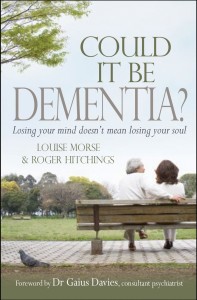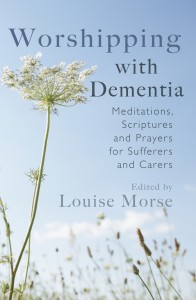
My daughter says that when I die, she will have inscribed on my tombstone, ‘She has finally found the ‘safe place’.’ Not that I’m riven by a sense of insecurity, but that I have a life-long habit of putting things in a safe place. The trouble is that I forget where the safe place is, exactly. I’ve another mysterious talent, too: like the magician, Toomey Cooper, I can move things from one hand to the other and make them disappear. A colleague watched me sorting papers one day and noticed how I scanned each piece thoughtfully but put it down without thinking as though my brain had moved on without registering the landing place. In fact, that’s exactly what’s happening – my brain moves on too quickly. Sometimes it takes itself to another place altogether. Listening to a talk on DVD of an American preacher with a California accent I was so drawn into the point he was making that, suddenly, I was back in my son’s kitchen in Menifee and instead of switching my electric kettle on I picked it up and put it on a gas hob, because that’s how we boiled water for tea over there. My expensive De Longhi kettle melted and I’ve mourned its loss ever since. Does this mean I’m a candidate for dementia? No it doesn’t. Among the thousands of people with dementia are those who have had a lifetime of more disciplined thinking than I have. Forgetfulness may be one of the signs that a person is developing dementia but it is usually a trait that is only recently developing. I mention it because it’s something my colleagues and I are often asked by participants at conference and seminars – ‘I’m forgetting things – could it be dementia?’ There are other signs that could indicate dementia, and I’ve described these in the books I’ve written about dementia, and in the Information Pack, ‘Putting the Pieces Together’. (www. pilgrims.friend.org.uk.)
Prevention better than cure. Dementia is one of the ‘greatest enemies to humanity’, said David Cameron in June, to an audience of 300 experts who have pledged to find a cure by 2025. Perhaps the biggest question is not so much the cure, as important as that is, but how to avoid it developing in the first place. Dementia is not an inevitable part of ageing, and people want to know what they can do to prevent it. Kirk Erickson, a psychologist at the University of Pittsburgh, found that regular physical exercise can effectively stimulate growth in the brain, helping to reverse early signs of neurodegeneration and improve performance on memory tests. Presenting his paper at the annual conference in Chicago of the American Association for the Advancement of Science he said, ‘The brain and cognitive function of older individuals remain highly plastic. It’s not the inevitable decline that we thought it was.” The exercise problem was a walk of 30 – 45 minutes three times a week. A Cambridge University study published in July (The Lancet Neurology) said that just one hour’s exercise a week can reduce the chance of Alzheimer’s disease by almost half, according to a landmark study which ranks the seven lifestyle threats fuelling rising levels of dementia. Healthy habits Scientists at Cardiff University have been following 2,235 men since 1979, looking at the link between disease and regular exercise, eating fruit and vegetables, staying slim, light drinking and not smoking. Researchers said that only one per cent of the population had all five healthy habits, with numbers unchanged over three decades. Five per cent had four. People who followed four out of the five healthy habits were 60 per cent less likely to suffer from cognitive decline or dementia, with exercise accounting for a significant chunk of the effect. So far 219 of the men have shown signs of cognitive decline and 79 have dementia.
Psychological health More and more research emphasizes the vital link between negative thoughts and emotions and their physical effects. People do die from a broken heart! The stress hormones released by the shock and grief of bereavement can cause lethal conditions such as stroke and heart attacks. Researchers at the University of London published a study of thousands of patients over the age of 60 who had lost a partner, showing a doubling in the risk of heart attacks or strokes within 30 days of bereavement. Stress and depression are risk factors for dementia, according to research. A 10 year study of 70,000 people in the UK found that of the 10,000 who died, those with the highest mental distress scores were more likely to have died from dementia than those who were psychologically healthy. The link between psychological distress and death from dementia was independent of other factors that may raise dementia risk, including smoking, alcohol abuse, or physical ailments like heart disease or diabetes. (http://www.alzinfo.org/03/articles/diagnosis-and-causes/anxiety-depression-increase-dementia-risk). Other studies join the dots between negative emotions, raised cortisol levels, inflammatory processes and physical illness, including dementia. Dementia care pioneer Tom Kitwood wrote, ‘Neuroscience now suggests that there may be very great differences between human beings in the degree to which nerve architecture has developed as a result of learning and experience. It follows that individuals may vary considerably in the extent to which they are able to withstand processes in the brain that destroy synapses, and hence in their resistance to dementia.’ (Dementia Reconsidered, 2002). My italics.
What can we do, then? We can develop emotional resilience. Controlling toxic thoughts and emotions is the theme of Dr Caroline Leaf’s book, ‘Who Switched Off my Brain?’ She writes, ‘Researchers say that 87% of the illnesses that plague us today are a direct result of our thought life … what we think about affects us physically and emotionally. It’s an epidemic of toxic emotions.’ Dr Leaf describes a ‘strainer’ that will only let through the thoughts we want to keep. A good tactic is to ‘take every thought captive to Christ’, 2 Corinthians 10:15. It is not events or things in themselves that disturb us, but the meanings we attribute to them. Hence the warning in Proverbs 4:23 to, ‘Watch over your heart with all diligence, for from it flow the springs of life.’ Depression, especially in later years, should not be ignored – see your GP and/or or a good, Christian Cognitive Behavioural Therapist. CBT was themed at first specially to address the dysfunctional thinking in dementia, and there is a body of empirical evidence showing that it works.

Worship – most important of all. Worship helps us to hold ourselves together. In one of his devotional books, Selwyn Hughes, one of Wales’ best-loved preachers, pointed out that in worship we find unity, not just with God but within ourselves: How do we get the framework, the sense of structure we need to be able to move effectively from one day to another, in a world where everything that seemed to be nailed down is coming apart? It is to be found in our worship of God. We enter into the presence of the Lord and lo, His unity becomes our unity.















